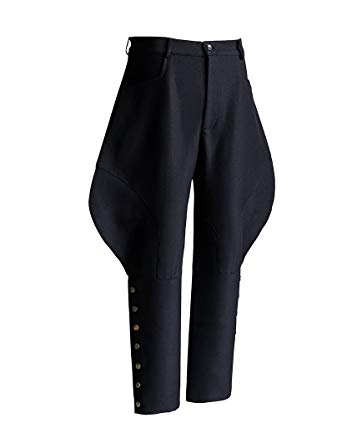
noun (used with a plural verb)
- Also called knee breeches. knee-length trousers, often having ornamental buckles or elaborate decoration at or near the bottoms, commonly worn by men and boys in the 17th, 18th, and early 19th centuries.
- riding breeches.
- Informal. trousers.
- too big for one’s breeches, asserting oneself beyond one’s authority or ability.
pl n
- trousers extending to the knee or just below, worn for riding, mountaineering, etc
- informal, or dialect any trousers
- too big for one’s breeches conceited; unduly self-confident
c.1200, a double plural, from Old English brec “breeches,” which already was plural of broc “garment for the legs and trunk,” from Proto-Germanic *brokiz (cf. Old Norse brok, Dutch broek, Danish brog, Old High German bruoh, German Bruch, obsolete since 18c. except in Swiss dialect), perhaps from PIE root *bhreg- (see break (v.)). The Proto-Germanic word is a parallel form to Celtic *bracca, source (via Gaulish) of Latin braca (cf. French braies), and some propose that the Germanic word group is borrowed from Gallo-Latin, others that the Celtic was from Germanic.
Expanded sense of “part of the body covered by breeches, posterior” led to senses in childbirthing (1670s) and gunnery (“the part of a firearm behind the bore,” 1570s). As the popular word for “trousers” in English, displaced in U.S. c.1840 by pants. The Breeches Bible (Geneva Bible of 1560) so called on account of rendition of Gen. iii:7 (already in Wyclif) “They sewed figge leaues together, and made themselues breeches.”
 Liberal Dictionary English Dictionary
Liberal Dictionary English Dictionary